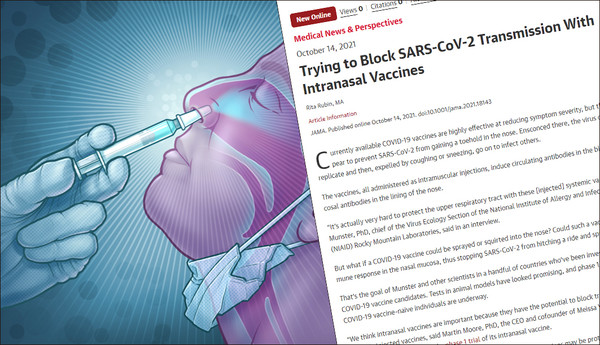An intranasal Covid-19 vaccine in the form of a spray could help overcome the shortcomings of intramuscular injections, a U.S. medical journal said.
On Tuesday, the Ministry of Health of the Russian Federation approved a phase 2 trial of a spray version of the Sputnik V Covid-19 vaccine.

Meissa Vaccines, a U.S. vaccine developer, is also working on a spray-type intranasal Covid-19 vaccine.
On Thursday, the Journal of the American Medical Association (JAMA) said in an article that intranasal vaccines could prevent viral transmission through the nose and serve as a good option for people who cannot receive conventional Covid-19 vaccines because of needle phobia.
According to the JAMA’s article, the intramuscular AstraZeneca vaccine protected rhesus monkeys exposed to the Covid-19 virus against pneumonia but did not reduce viral loads from their upper respiratory tract.
Also, in July, diagnostic testing of 469 people in a cluster infection in Provincetown, Massachusetts, showed that viral loads in the noses were similar in vaccinated and unvaccinated people.
In a recent study, which has not been peer-reviewed, African green monkeys inoculated with Meissa’s investigational intranasal Covid-19 vaccine had their viral shedding in their nose reduced by more than 200-fold, the JAMA’s article noted.
In a pre-clinical study in rhesus monkeys, monkeys inoculated with the intranasal vaccine had less virus in their nose, and lung tissue than unvaccinated monkeys, and vaccinated monkeys did not develop pneumonia symptoms either.
However, more investigations are needed because too few animals established clear correlations, the JAMA said.
Intranasal vaccines could become an alternative to intramuscular Covid-19 vaccines for people with needle phobia, it also said.
According to a study by a research team at the University of the Incarnate Word (UIW) published in the SAGE journal, up to 66 million American people are estimated to have avoided Covid-19 vaccination due to needle phobia.
However, the JAMA said that despite the advantages, intranasal vaccines’ effect of preventing Covid-19 was relatively disappointing compared to conventional intramuscular vaccines.

